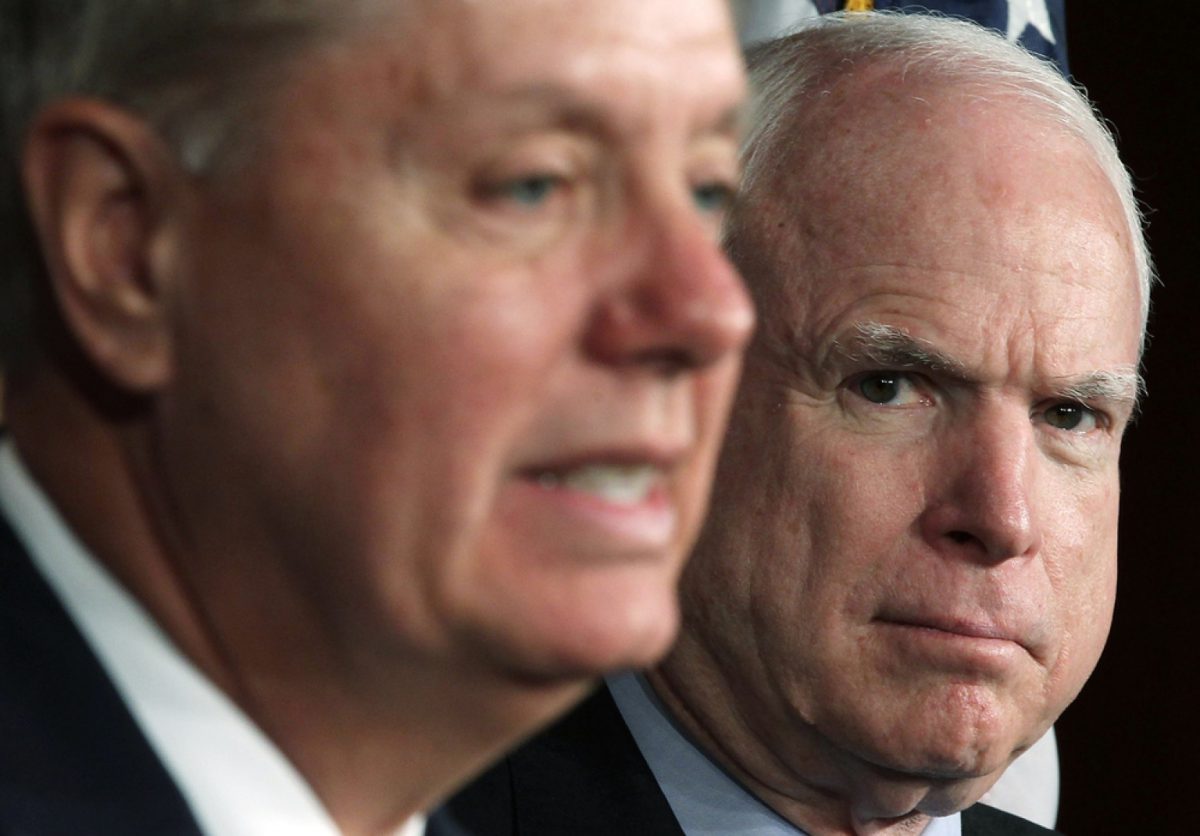When tea party or libertarian Republicans oppose U.S. military intervention or aid in Ukraine, Syria or any other hot spot they are regularly labeled “isolationist” by mainstream media outlets. The same term is now commonly used to describe the growing number of war-weary Americans who believe the U.S. tries to do too much around the world militarily.
Videos by Rare
But is “isolationist” accurate?
Imagine reading foreign policy stories about Hillary Clinton, Lindsey Graham or John McCain where they were regularly described as “warmongers.” Could you imagine seeing headlines about new polling data that read, “Warmongering just hit a 50-year high” or “Warmongering soars among Americans?”
Obviously, most people would not consider this acceptable objective journalism.
But is it true that Clinton, Graham and McCain have either voted for or supported every proposed U.S. military intervention in the last decade? Yes. Is it true that they have been vocal or enthusiastic about doing so? Yes.
Is it true that certain hawkish leaders often seem unhinged in their zeal for military action?
Yes.
Still, no one at the Washington Post, the New York Times or with Gallup would dare label them “warmongers” because that term is meant to be an insult.
“Isolationist” is also an insult. National Review’s Jonah Goldberg is right: “Some reporters say that they’re using isolationist as a descriptive label, not as a pejorative term. This is nonsense. First of all, it simply is a pejorative term.”
Goldberg notes:
Why is isolationism only about military strikes? What about trade? Immigration? If you throw that stuff into the mix, libertarians are far less isolationist than most Americans, and yet libertarians are supposedly the heart of this new isolationism. How strange.
The term is insulting and inaccurate on many levels but perhaps the most damning is that it associates today’s foreign policy critics with Americans who wanted to keep the U.S. out of World War II. “Isolationist” portrays anyone who questions intervening in Syria, for example, as somehow being the same as Hitler appeasers.
How do we know this? Because the people most eager to use “isolationist” as a weapon are also quick to tie it to World War II and a narrative of appeasement.
- Says Senator John McCain: “We cannot move into an isolationist party. We cannot repeat the lesson in the 1930s when the United States of America stood by while bad things happened in the world.”
- Says former Senator Joe Lieberman, “economic problems and public war-weariness have spurred calls from Democrats and Republicans alike for neo-isolationist policies… But the attack on Pearl Harbor demonstrated that the United States could not avoid the responsibility of engagement…”
- Says Charles Krauthammer: “The return of the most venerable strain of conservative foreign policy — isolationism — was utterly predictable. Isolationists dominated the party until Pearl Harbor…”
- Says Rep. Peter King: “you know the Republicans had this debate back in the 1930s when you had the isolationists and the Charles Lindberghs saying we should appease Hitler.”
- Says King again (he says it quite often, actually): “This is an isolationist wing of the party, which I thought that we rejected with Charles Lindbergh back in the late 1930s and early ’40s.”
Few, if any, Americans today regret that the U.S. and Allied forces helped defeat Nazi Germany and Japan. Not a single member of Congress who opposed some of Obama’s recent proposed military interventions believes this (though Washington Post’s Dana Milbank insists there are “roughly 15 isolationists in the Senate GOP caucus”).
Perhaps most important, if every conflict abroad, from here to eternity, is now analogous to World War II—this is literally a blueprint for perpetual war. If every bad guy really is another Hitler, then obviously we would have to stop them.
Is this an intellectually serious way to look at foreign policy?
Is it possible that not every conflict around the world is comparable to the rise of the Third Reich? And is it possible that it doesn’t make you a Charles Lindbergh isolationist to say so?
“Isolationist” is exactly what foreign policy hawks would like those hesitant to go to war to be portrayed as, particularly the negative historical connotations that come with it. Allegedly objective journalists who use it as a descriptive term are actually taking sides in the foreign policy debate, however unintentionally.
Could we perhaps find a more accurate (and less lazy) way to describe politicians and citizens who simply diverge from the Washington foreign policy consensus? In the name of responsible journalism?
Either that, or we should start seeing “warmonger” more in the future.



